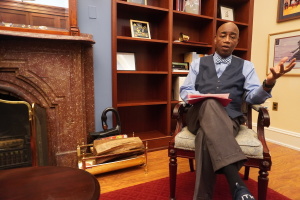Expert shares warning about AI's impact on Christians' spiritual development

An expert on artificial intelligence recently delved into the ways in which it can impact Christians' spiritual formation in unforeseen ways, including changing what it means to be human.
In a recent episode of Dallas Theological Seminary's “The Table” podcast, titled “Using AI in Ministry,” John Dyer, DTS' vice president for enrollment in educational technology, and Drew Dickens, founder of a ministry called Encountering Peace, who also studied generative AI for his dissertation, discussed the topic.
Responding to a question posed by co-host Bill Hendricks about how AI can influence spiritual development, Dickens replied that it comprises “a broader sociological question” of “what does it mean to be human.”
As an example, Dickens pointed to how Christians are called to memorize and meditate upon the Bible, and yet AI poses the question of “do I really have to memorize these verses?”
“Meditate on the Word both day and night, but now it can do that for me. And so, I think it has tremendous potential to affect what it means to be human,” Dickens said.
Dickens also pointed to the example of prayer and wanting an answer from God to questions offered in prayer or wanting a church to respond to questions of faith and doubt.
“Now we have access to this system that will listen to me 24 hours a day, that will respond without judgment, that has access to the world's writings on whatever theological view that I agree with or embrace,” he continued.
“How does this affect me as a follower, as a believer? What does this do with pastoral training?”
Hendricks noted that while some people think AI will eventually try to “wipe out humans,” another possibility is that “something that could be much more subtle” will occur instead.
“We don't yet really know what to call something that has, at least, faint stirrings of a person, but there's nobody there,” Hendricks said.
“But we get so accustomed to engaging with it, we're having conversations, it's doing a lot of creative things for us, solving a lot of problems for us that slowly but surely, we just kind of become a nothing. I mean, all we do is just speak into a machine and everything happens.”
Dickens stressed that people “have to be mindful that it's happening” as they're using AI technology all the time through things like GPS systems or Netflix searches.
“I think we have to be mindful that it's happening and having an honest conversation with ourselves, how is this affecting me today?” he posited. “Be aware of that within our community, have this conversation with other pastors, with your own family members.”
In recent years, much has been made of the use of AI in churches and ministry organizations, including church resources and materials, and even sermons.
Earlier this year, an Episcopal Church chatbot known as “Cathy” was launched, with the program seeking to answer questions about the denomination and its beliefs.
The Episcopal chatbot was developed by the Toronto United Church Council’s Innovative Ministry Center and the TryTank Research Institute at Virginia Theological Seminary.
The Rev. Lorenzo Lebrija, executive director at TryTank Research, told CP in August that he believed Cathy was meant to be “a tool and in no way a replacement for human interaction.”
“To be clear, AI should never be used in place of people, and that is not the intent of Cathy. Cathy regularly encourages people to seek further, deeper advice from local clergy or spiritual guides,” Lebrija said.
“Ideally, Cathy is a tool that can allow us to grow deeper into the Episcopal faith.”




























